Michael Patrick Hicks's Blog
December 5, 2018
New Website Launching Soon!
Over the course of December, things are going to be slowing way down at this blog. In fact, I fully expect this post to be the last entry in this blog.
Here’s what’s happening:
In January, I’ll be launching a brand-new website, High Fever Books, devoted solely to reviewing genre fiction, with a particular focus on horror, science fiction, and crime/mystery/thriller releases. I have a couple of contributors lined up that will be helping me keep that site running with fresh content and regular updates, so it won’t just be me shouting into the void. Instead, I’ll be yelling into the void alongside a few others.
If you’ve been a regular reader to this blog because of the review content I’ve been publishing here, first of all thank you! You’ll definitely want to bookmark High Fever Books. Although that site officially launches in January, I’ll be peppering in a few updates there between now and then, taking a sort-of soft launch approach to it. Make sure you subscribe to that blog’s newsletter, as well, so you can get weekly updates on the books we’re talking about delivered straight to your in-box.
Although I have a couple of contributors lined up for High Fever Books, I’m always looking for more! I want a plurality of voices talking smartly and sensibly about books and reviewing genre fiction, and the more diverse the better! If you’re a book reviewer in need of a home for your scribblings, e-mail [email protected]. [Note: I hate to say this, but as with most team-run book review sites, contributors are unpaid beyond being given a platform, and it’s highly, highly, highly unlikely the website will ever turn a profit, so please be aware of this!]
As far as this site, well, it’s going to become what it was always intended to be, and that’s simply my author website. This site isn’t going away anytime soon, and its singular focus will be to help promote my own books and stories. MichaelPatrickHicks.com is going to be solely for Michael Patrick Hicks books. Reviews and promotions for other authors will all be happening at the new review blog. All those reviews, guest posts, etc. that were posted here will be going dark, but will not be disappearing entirely. All of those past reviews I published here will still be accessible via my Goodreads page.
If you’re interested in staying up to date on my works, make sure you subscribe to my newsletter! As 2019 progresses, I’ll have updates to share on the release of three brand-new books, and just maybe a few other things as we go along. And be sure to check back on this site’s homepage every now and then, too, for updates as they come along.
Want to stay on top of absolutely everything? Here’s what you need to do:
Bookmark High Fever Books
Subscribe to the High Fever Books newsletter and get updates delivered straight to your in-box
Bookmark MichaelPatrickHicks.com
Subscribe to my newsletter to receive updates
In the meantime, watch out for updates on the High Fever Books website, because they’ll be coming very, very soon!
December 1, 2018
Review: Coyote Songs by Gabino Iglesias

Coyote Songs
By Gabino Iglesias
My rating: 5 of 5 stars
On an island in the New York Harbor, a French woman stands tall, proud even. Time and ocean have covered her body in a green patina, but her torch and all that she stands for still shine. A handful of words epitomize the sum of her ideals, and those of her country:
Give me your tired, your poor
Your huddled masses yearning to breathe free
More than two thousand miles away, migrant children, babies, women, and men fleeing violence in their home country of Honduras are tear gassed as the US Border Patrol fires across the US-Mexico border. The tear gas is banned in warfare, and yet American police routinely and liberally use it against American citizens protesting various causes and politics, an authoritarian reminder from the state to its citizens on who has the bigger dick. Now, despite the Geneva Convention, we turn a potent chemical upon the unarmed, the weak, and the helpless. Political asylum seekers awaiting their turn to apply are identified by the numbers marked upon their wrists, an image that recalls the Nazi persecution of Holocaust victims in World War II. Elsewhere along the border, children are torn away from their family, many seemingly never to be returned despite US court orders, housed in newly erected concentration camps.
This is America.
This is a young country that has, over time, built its own mythology, full of righteousness and idealism. It is a myth that has been sold to its own citizens and the rest of the world in turn, predicated upon these inalienable rights that we hold to be self-evident, a simple and common truth that all men are created equal and endowed with the right to life, liberty, and the pursuit of happiness. We then, in turn, elect to represent us an embarrassing cadre of racists, sexists, and the moronic, people who on a daily basis remind us that the American myth is merely that. We elect to the highest office in our land a man who calls white supremacists very fine people and decries all Mexicans as little more than rapists and thieves. The Christian evangelicals among us demand that we, in turn, speak of these politicians with deference and civility.
This is America. A country built by immigrants, its borders drawn upon murder and bloodshed and theft. A melting pot of immigrants and the descendants of immigrants who, in turn, vilify immigrants and condemn immigration. Myth versus reality.
The tension of myth running headlong into reality is at the beating and bloody heart of Coyote Songs, a mosaic novel set along the US-Mexican border. Through a handful of characters, Gabino Iglesias presents to us the life of those living along la frontera, characters who are driven by the myths and beliefs of their forebears and who have internalized the myth of America and want in on a piece of the action, hoping to flee the impoverishment and violence of their barrios and succeeding only in finding themselves ensnared in an old and familiar cycle of violence and impoverishment elsewhere. We have sold them a promise, and with it a false bill of goods.
Pedrito's father speaks more English than Spanish, believing a fluidity in his adopted language will make their eventual escape into America easier, opening for his family the doors of opportunity. Alma, a multicultural, bilingual black Puerto Rican in Texas, believes she'll make it big as an artist, until she runs headlong into the realization that she's little more than a puppet for the rich and entitled whites, like Mr. Wilson, who offers her a free venue in order to capitalize upon her performance, and hopefully, later, her body. The coyote runs kids across the border because he believes that such is his mission in life. We never learn his name, but have no need of it; he is a man defined by his job - he is the coyote, nothing more or nothing less. He is a servant of La Virgencita, and saving the children by helping them flee into America, the land of so much promise, is his sole purpose. And then, in the desert, there is the ghost of Inmaculada, thirsting for revenge.
Coyote Songs is ugly at times, necessarily and honestly so. It's a dusty noir told with a dry desert rasp, and it's all the more powerful for it. Gabino Iglesias is one hell of a writer, his voice authentic and predicated upon lived experience, observation, and honesty. I don't know anything about Iglesias's background or his personal history, but I know from reading Coyote Songs that he writes with authority and sincerity. There's no sugar coating his characters, and each come across with a natural rawness. Even those with idealism are shaded with the expectation of violence, of having to fight for what they believe in, knowing full well that they will be handed nothing nor given any quarter because of the color of their skin and the language on their tongue.
Iglesias spins a compact yet wickedly strong narrative through a revolving door of voices, cycling between his characters to share with us the darkness of their lives, and the minor bits of light that momentarily befall them. Not a word is wasted, his sentences punchy and pointed, driven into the reader with the practiced smoothness of a skilled craftsman.
Most important, though, is its fundamental honesty. Iglesias forgoes any kind of romanticizing of la frontera life, and he refrains from gilding the American promise in our time of political upheaval and turmoil. For those along the border, there is no escaping the threat of the orange idiot and the corrupt ICE who kidnap children to sell them to gangs and cartels. This book is raw and honest, and written so smoothly the pages turn themselves. Iglesias has plenty to say, and when he throws a punch, always properly justified here, it lands hard. There's a balletic grace to the violence, a poetic refinement to the writing, and a constant truth that sounds throughout. Coyote Songs is a book of and for our times, its author a vital voice we would do well to pay attention to.
View all my reviews
November 30, 2018
Review: Joe Ledger: The Missing Files by Jonathan Maberry [audiobook]

Joe Ledger: The Missing Files
By Jonathan Maberry
My rating: 3 of 5 stars
Joe Ledger: The Missing Files presents five short stories that exist in and around the events of Jonathan Maberry's first three Joe Ledger novels. As I've come to expect of Maberry, each story is competently written, filled with plenty of action and smart-ass wit, and the audiobook's narration by Ray Porter is, also as expected, a top-notch delivery.
The main sticking point here, though, is that the first few stories feel pretty disposable. Kicking off this collection is "Countdown," a wholly unnecessary prequel to the first book, Patient Zero. I'm not sure who this story is ultimately aimed at, frankly... If you read the first Joe Ledger book than you already know this story, which involves the raid on a Baltimore warehouse that ultimately earns Joe the attention of Mr. Church. If you haven't read Patient Zero, I'm not sure there's enough meat on this short story's bones to compel you to latch onto and stick around for the main course. Mostly, this story feels like stuff that was edited out of an earlier draft of Patient Zero and was re-purposed as a very short short story.
Zero Tolerance follows on the heels of Patient Zero, with Joe and his DMS squadron tracking down one of that book's surviving terrorists. It's a sharp little story, but, like "Countdown," it's not exactly indispensable. Ditto "Deep Dark," which has Ledger and his crew squaring off against terrorists in an underground vault. It's a neat story involving transgenic modification of human test subjects, written as a precursor to help tease The Dragon Factory. While I can't say it's redundant, and Maberry does enough things differently in this short story, "Deep Dark" also feels almost exactly like a particular encounter that occurs in The Dragon Factory.
It's not until the last two stories that we get to the really good stuff, and they present some original concepts as Maberry finds his feet with Ledger and company existing in short-form narratives. "Material Witness" sees our band of DMS operators taking a trip to Pine Deep, the setting of another Maberry series. I haven't read the Pine Deep trilogy yet, but there's enough teases of information in "Material Witness" and Church's presentation of the official cover story to pique my interest and move those books further up my To Be Read pile. This story is just flat-out cool, involving an author whose cutting edge thrillers have made him a wanted man by various terrorist factions. Maberry shades "Material Witness" with plenty of The X-Files inspired intrigue, enough so that I could practically hear Mark Snow's theme playing as the story's final denouement plays out. That's no bad thing at all, mind you.
"Dog Days" was my main reason for checking out The Missing Files, and it delivered exactly what I had hoped for. Ledger's second novel-length outing, The Dragon Factory, ended on a bit of a cliffhanger. I was immediately disappointed to discover all those loose ends wrapped up before book three, The Plague Factory, even started, and with Ledger suddenly having a canine partner to wage war alongside of. Well, all that connective material is told in this short story, which introduces Joe's new partner, Ghost, and puts him on the hunt for The Dragon Factory's escaped assassin. Maberry does a fantastic job condensing all of the fun interpersonal dramatics between Ledger and his comrades into this short, before launching into all the action. Given the way the second book ended, Joe is in a bit of a dark place; it has some necessarily sad overtones, but thankfully revenge is sweet and Maberry writes one hell of an action-packed finale.
Joe Ledger: The Missing Files is not an indispensable read, at times coming across more like deleted scenes from the core body of work, but it does tie up a few loose ends here and there, even if it sometimes feels repetitive of particular plot points covered in the full-length novels. "Material Witness" and "Dog Days" are the clear stand-outs here, providing enough story to satisfy. The rest are largely ancillary, recommended only for Ledger completionists.
View all my reviews
Review: Everything is Horrible Now by Edward Lorn
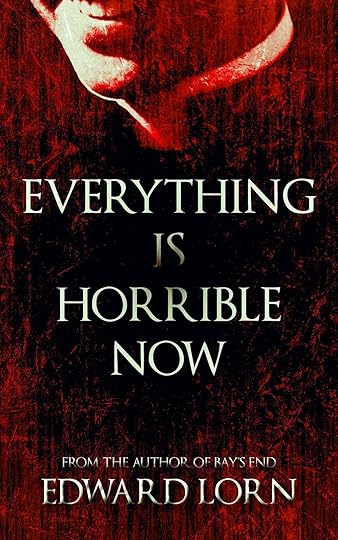
My rating: 4 of 5 stars
After reading and naming Edward Lorn's The Sound of Broken Ribs my number one read of 2017, it was high time I got around to reading more of the dude's stuff, his Bay's End books in particular. Over the course of 2018, I've been able to catch up on this series, with the exclusion of Fog Warning, and one thing that's immediately noticeable is just how much Lorn has grown as an author since Bay's End.
Everything is Horrible Now, the penultimate chapter in this All Things Lead to the End cycle, is his most adeptly written, and most complicated, work to date. If, as one character explains here, time is like a pretzel, then traveling through Bay's End is like peeling an onion. There are layers and layers of complexity here, and the further you dig beneath the skin the more things start to sting (and yes, over the course of this series as a whole, sometimes there are plenty of tears).
Right from the opening paragraph, you can sense that Everything is Horrible Now is something of a departure from previous Bay's End books. Through a highly omniscient third-person perspective, we get a rough inkling that there's a grandiosity to Lorn's scope here. Even while the previous two books have dabbled in varying degrees with cosmic horror, it's immediately clear that this particular element will have a significantly larger role to play in these here narrative underpinnings. And, hot damn, does it ever.
It starts off simply enough, if such a thing can be said of the Bay's End bishop, Father George, murdering his family before taking his own life. What follows, though, is a densely plotted narrative that twists its way through a large contingent of well-developed characters (some familiar), meditations on the nature of god and religion and the irreligious and the evil that religious fundamentalism can foment, and the structure of time itself. It's a doozy, simply put.
There's a lot going on here, and Lorn navigates the highways and byways of Bay's End with aplomb. I good and truly dug the exploration of one homosexual character's relationships and forced conversion therapy treatments, which reminded me a bit of the old British TV series The Prisoner. As an added bonus, for all all the goofballs out there still complaining that a gay character's sexuality must somehow be integral to the plot (despite this never being an issue with straight character's sexuality), well, Lorn sees you, has heard your silly complaints, and will now proceed to make your head explode.
Lorn gets a metric ton of stuff right in Everything is Horrible Now, and the book maintains a steady pace, giving up a narrative that is impossible to shake loose and escape from. Not everything is perfect, though, and a few elements feel slightly half-baked, such as a rape survivor and a ghost baby that never quite mesh, particularly in light of how the overarching narrative resolves itself. The book's ending itself is both an intellectual curiosity and a point of contention, one that I'm not quite able to fully resolve at this time.
As with the finale to The Bedding of Boys, Lorn has constructed one hell of a lead-in to the 2019 series finale in No Home for Boys that has me itching to see how this all wraps up. It puts some particular pieces on the game board that will no doubt have an incredible impact on what comes next, and what has come before, and I'm damn excited to see how it shakes out. On the other hand, without spoiling the particulars, it's also the type of ending I don't typically enjoy on the surface. It's not emotionally satisfying, but it is intellectually and philosophically intriguing and has me chomping at the bit to see what comes next.
I feel like I might not be able to adequately square away the finale to Everything is Horrible Now until we've reached the end of Bay's End proper. It's also a bit of a monkey wrench of an ending, in that I have absolutely no friggin' idea where Lorn's taking all this. Literally anything can happen at this point, which is certainly exciting, and I'm damn well gonna be here for it.
[Note: Although I purchased the signed/limited edition Thunderstorm hardcover of Everything is Horrible Now, this review is based on an electronic ARC of the forthcoming retail edition provided by the author.]
View all my reviews
November 24, 2018
Review: Hellhole: An Anthology of Subterranean Terror, edited by Lee Murray
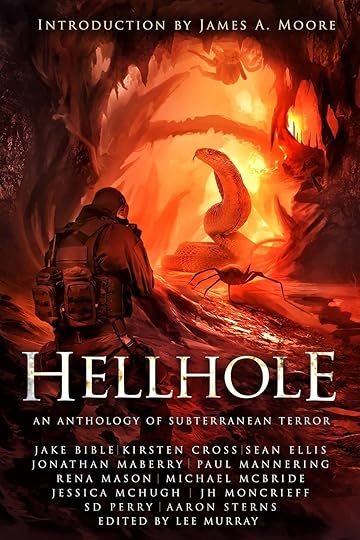
Hellhole: An Anthology of Subterranean Terror
By Jonathan Maberry, Rena Mason, Michael McBride, Jake Bible, Sean Ellis, Kirsten Cross, Paul Mannering, S.D. Perry
My rating: 4 of 5 stars
Subterranean adventures are one of my favorite, must-read horror sub-genres (arctic terror is #1 and if anybody knows of any anthologies in this vein, or is planning on curating one, hit me up because I want to read the hell out of that!), so when New Zealand author Lee Murray announced she was editing Hellhole: An Anthology of Subterranean Terror and David Wood over at Adrenaline Press (and author of the Dane Maddock adventures) offered me an ARC, I immediately jumped at the opportunity to read this bad boy. A quick glance at the list of contributing authors lets you know straight away that you're in good, capable hands.
As Christian Bentulan's cover art suggests, Hellhole is a militaristic anthology, and the stories collected within follow similar beats of a military unit or similar such government agency finding their way into the bowels of the earth and encountering things they previously only could have imagined.
Jonathan Maberry kicks off Hellhole with a brand-new Joe Ledger novella set in the aftermath of his latest release, Deep Silence. I'm a late-comer to the Ledger series, but what I've read of it so far has made me a very quick convert and it's become a fast favorite of mine. "All The Devils Are Here" sets a damn high bar for the authors that follow and it's the perfect opener to this anthology (however, if, like me, you're not entirely caught up on Ledger's main book series, there is at least one big spoiler regarding a significant plot point from Deep Silence, so fair warning).
Blessedly, the writers tasked with the unfortunate challenge of following in Maberry's footsteps are wholly up to the task. Michael McBride, a favorite of mine going back to his DarkFuse days with his two Snowblind novellas and, more recently, his Unit 51 series for Kensington, delivers a top-notch bio-thriller with his "A Plague of Locusts." I can always count on McBride to deliver the goods, and his weird science run amok story here is no exception. It's a Crichton-esque horror story that reaches back to the US’s biological and chemical weapons research during WWII, and it has a good bit of environmental commentary, too, as all that crap dumped into the earth wreaks havoc in the present day.
Hellhole serves up a pretty wide variety of locales with the stories globe-hopping all over the place. J.H. Moncrieff takes us to Russia in "The Offspring," a short story nicely steeped in speculation over the Dyatlov legend, an incident that also served as inspiration for her Return to Dyatlov Pass creature-feature novel earlier this year. Aaron Sterns takes us into an underground Australian drug lab in "Black Lung," before Jake Bible takes us into the heart of the Amazon to fight a Ginormous Hell Snake. Paul Mannering's "Where The Sun Does Not Shine" provides a nice break from the book's predominately Earthly exploits by venturing into a hostile foreign world. It's not exactly a groundbreaking story (ha ha) with its highly familiar and obvious Aliens meets Tremors-inspired mashup, and is perhaps a bit too straight-forward of a run and gun adventure, but it sure is fun.
And fun is the name of the game here! Lee Murray did a bang-up job assembling a broad range of talents well-known for their prowess in crafting smart, highly entertaining military horror thrillers and lets them off the hook to dig some deep, dark, dank holes to explore. The end result provides plenty of action, mayhem, and more than a few interesting creatures and speculative terrors. Hellhole is a remarkably strong anthology that hits the (under)ground running and doesn't let up.
[Note: I received an advance reading copy of this title from the publisher, Adrenaline Press.]
View all my reviews
November 16, 2018
Review: The Sorrows by Jonathan Janz

The Sorrows (Fiction Without Frontiers)
By Jonathan Janz
My rating: 5 of 5 stars
When Samhain Publishing shut down in 2016, readers lost a wealth of great horror novels and up-and-coming authors. Granted, many of those books have found their way back to market in some form or another and those authors have been able to pursue new opportunities in indie publishing, either self-publishing or signing on with small presses. One of the hardest losses for me was the wealth of material from Jonathan Janz that up and vanished. Luckily, new publisher Flame Tree Press snatched him up and will be publishing his new titles along with his entire back-list.
Originally published in 2011, The Sorrows is the first to get a reissue. Fittingly enough, this was also Janz's debut novel, although it sure as hell doesn't feel like it. Coming into The Sorrows for the very first time seven years after its first publication date, I'm a bit surprised at just how much it doesn't feel like a first novel.
Usually when you've been reading an author's later works, you can tell you're taking a few steps back with their earlier stuff. Typically, those books just don't feel as polished or maybe the author hasn't quite found his voice yet, or possibly some plot points are a little sticky, if not downright sloppy, regardless of whatever promise they show. They're young pups learning their craft, a rising star whose hasn't quite found his groove yet. You've know they've got that special something, but they just haven't hit their fullest potential yet.
Well, The Sorrows doesn't suffer from any of that first-novel syndrome, and, man, Jonathan Janz hit the fucking ground running with this one. It makes me wonder how many shoddy trunk novels this dude squirreled away before he felt sure enough of his own talents that he finally pursued publication. Seems to me, Janz emerged fully-formed, his authorial voice strong, and his talents firmly on display and ready to rock. Maybe it seemed this way to Janz, too - The Sorrows is peppered with references of things to come. Take, for instance, the name of the film many of this book's characters operate on the periphery of, House of Skin, a film that shares the title and plot elements of Janz's second (and, at the time of this book's original publication date, then unpublished) novel. Even our lead male protag's name will sound awfully familiar to those familiar with the setting of Savage Species and Children of the Dark.
Ben Shadeland is a film composer with writer's block. Not a good thing to have when the film he's supposed to be scoring is ready to get locked-in and its release date is coming up fast. Hoping to avoid a breach of contract lawsuit, Ben's partner Eddie has them and their assistants, Eva and Claire, flown out to an abandoned castle situated upon an isolated island sure to get the creative juices flowing. Since this is a horror novel, there's plenty of other bodily fluids flowing and spilling all over the place, too.
What's most interesting about The Sorrows is the plot itself, particularly in the clever ways Janz develops and subverts the haunted house genre. While it shares plenty of aspects and more than a few devices with your typical ghost story, Janz takes it up a few notches, giving readers not only a haunted castle, but haunted people as well, along with a really interesting development that I didn't see coming.
This is a dazzling story, and the horror tropes at the core of it are well explored, particularly the history of Castle Blackwood and the ignominious murders that have since left it deserted. Janz's talents in delivering a fully and deeply layered horror story are solidly evident here, as is his incredible knack for characterization. Early in the book's opening, we get a look at Ben's marital troubles and the anguish his separation from his son is causing. We don't spend a lot of time with his ex-wife, but based on the state three-year-old Joshua is in, this probably isn't a bad thing at all. Through only a few sentences, Janz is able to tell us a lot about the kind of mother Jenny is, and we can infer pretty easily the type of spouse she was for Ben. I've always been impressed with how Janz can communicate so much about his characters in so little words, in such small spaces, and immediately get us to ally ourselves with his protagonist and hate his repulsive human antagonists. It's a talent he's only gotten better at since this debut, but even here it's still pretty damn sharp.
Pretty damn sharp, too, was Flame Tree Press for locking down the rights to Janz's work. That's some smart business sense right there, and I'm looking forward seeing the rest of this author's catalog getting a rapid release over the course of next year. There's a lot of Janz's books I haven't read yet, and I'm excited to dive into them as they relaunch. With a brand-new release dropping in the middle of all this, it's safe to say 2019 will be the Year of Janz and I, for one, will be celebrating all year long.
[Note: I received an advanced reading copy of this title from the publisher, Flame Tree Press, via NetGalley.]
View all my reviews
Review: The Summer Job by Adam Cesare [audiobook]
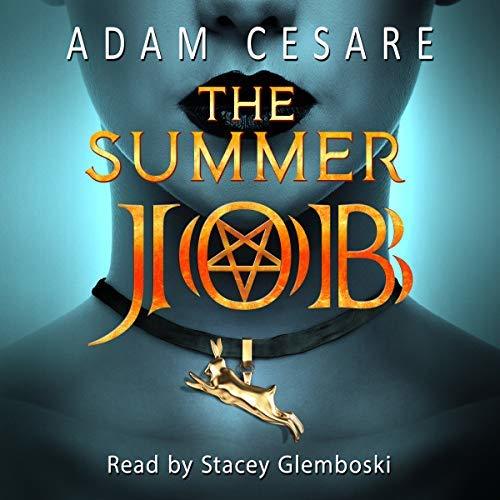
The Summer Job: A Satanic Thriller
By Adam Cesare
My rating: 5 of 5 stars
In a recent blog post to promote the audiobook release of The Summer Job, Adam Cesare wrote about how it hasn't been as successful sales-wise as his Video Night but that he's still hopeful it's able to find the right audience. "While I’d never say one of my books is better than the other, I will say that The Summer Job feels more personal," he said. Following Cesare online, through his blog and social media, anytime The Summer Job comes up, it's obvious that this book has a very special place in his heart and that he is - rightfully - damn proud of the work he did here.
The Summer Job is a work of satanic folk horror that finds goth-punk chick Claire taking a job at the Brandt Hotel. Located in a small town a few hours outside Boston, the hotel is Mission's best-kept secret - a popular and well-regarded establishment, it's been highly praised by past guests. Or at least those who have lived long enough to talk up the perks of their accommodations. When Claire takes on the role of guest liaison, she thinks it's a chance to redefine her life and maybe reinvent herself. It's not until later, of course, that all the peculiarities of the Brandt and its staff start pointing toward much, much darker secrets...
Whether you read or listen to the audiobook edition, it's readily apparent that The Summer Job is a labor of love. I've read, maybe, half of Cesare's oeuvre thus far and I dig his style and startlingly clear affection for the horror genre a lot. The Summer Job, though, is Cesare operating a higher level. His characters and their story arcs are pretty phenomenal, and the writing is solidly on-point.
Early on, he describes a chef behind the pick-up counter at a restaurant as being window-boxed by the frame; it's a small thing to be sure, but the particular word choice and details provided are careful and deliberate, as are a lot of Cesare's other stylistic choices here. The ensuing description of the man's sweat clouding the metal counter-top, and the dialogue between him and Claire, make for a highly memorable and cinematic scene that cements exactly who these characters are, and more importantly that Cesare knows exactly who these characters are. He knows these people and he's smart enough to get out of their way and let them work their mojo. Through a bit of deft dialogue, he introduces Claire's friend Allison, along with her particular ticks that let you know right off the bat who this girl is, unnecessary abbreviations and all. "What are you doing on the Newb," she asks Claire, referring to Newbury Street, and calling her "babykins."
Cesare's operating in a character-rich environment here and we get to know most of his cast very, very well over the course of the book. This is both good and bad. Good because we become intimately familiar with Claire and the people of Mission, and bad because getting to know the employees of the Brandt means we can't fully trust any of them and we're constantly on edge waiting for them to freak out. Cesare does a fantastic job establishing Mission's behind-the-scenes power struggles, letting readers in on alliances, history, and secrets Claire isn't privy to. We worry about her, and Claire is pretty damn easy to sympathize with, even as we're never sure what those around her want or what they'll do to get it.
The Summer Job has a lot going for it, from its leading lady to the clashes between opposing forces within Mission, but reigning supreme over it all is narrator Stacey Glemboski. It didn't take me long to start searching out other titles she's narrated, knowing full well that I'm going to be looking for more of her work. She's an excellent narrator, shifting smoothly between male and female voices, accents, tones, and delivery. This isn't a long book, less than eight hours, but it's so easy to listen and sink into that it feels much shorter.
Between Cesare's writing and deft characters and Glemboski's reading, I was freaking hooked the whole through. The Summer Job was absolutely terrific, and also a necessary reminder that I really need to get my ass in gear and fill those gaps that I've missed in Cesare's work.
[Note: I received an Audible copy of this title from the author following my request through AudioBookBoom and I provided this voluntary review.]
View all my reviews
November 12, 2018
Review: Night Shift by Robin Triggs
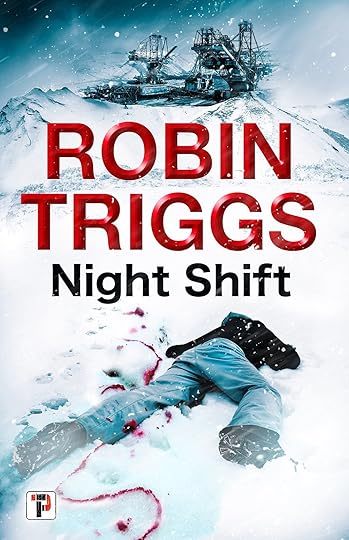
Night Shift (Fiction Without Frontiers)
By Robin Triggs
My rating: 1 of 5 stars
Robin Triggs delivers an initially-solid-but-ultimately-rage-inducing Antarctic mystery-thriller peppered with a few doses of low-key science fiction concepts, in his debut, Night Shift.
As the Australis base prepares for six months of darkness, a freshly-appointed security officer, Anders Nordvelt, arrives just in time for the crew to find themselves under attack. Obviously, it doesn't take long for Nordvelt to become the prime suspect in the baffling string of disasters befalling the Australis's researchers and miners, and Triggs keeps both Anders and readers guessing about the real culprit and his or her motivations in this little whodunnit.
The isolated Australis is positively rife with suspects, from the overbearing and sexually promiscuous base commander, right down to the janitor, Max, who keeps herself secluded from the rest of the crew and surrounded by jury-rigged robots and welded metal sculptures. Seemingly everyone has a motive, and as Triggs reveals new facets of his characters he gives readers plenty of meat to chew on as the guessing game wears on.
While the mystery aspect of Night Shift is pacey and intriguing, the science fiction aspects feel a bit tacked on, and even superfluous at times. Triggs gives us small doses of near-future tech and hints of a dystopic Company-ruled world at large, but these minor conceits are never explored deeply enough to feel wholly necessary. Even the book's climax, which ultimately hinges on the half-baked incorporation of these sci-fi elements, lacks the necessary oomph and depth of information to really deliver a powerhouse of a finale as the culprit's motivations come unraveled.
After seeing how the all pieces fell together, I was still left with a frustrating question of why? Why was any of what happened necessary? Unfortunately, Night Shift isn't able to provide a satisfying answer to resolve its own premise, and Triggs simply doesn't do enough world-building or provide us with enough information to make the culprit's motivation for the attacks feel smooth and logical. Worse still, in a brief supplemental interview with the author at book's end, Triggs compounds the lack of information in Night Shift with a promise to explore all this stuff in better detail over the course of a trilogy. As far as I'm concerned, it's a cardinal sin, as well as a rage-inducing annoyance, to knowingly fail to properly execute a narrative in book one, hinging the importance of your book's finale on concepts reserved for book two, and promise to make it up to readers at a later date. Night Shift's finish is the type of cash-grab finale that makes me hate the whole damn thing, which is a shame because I did enjoy most of it, right until it royally pissed me off for wasting so much of my precious time.
The bulk of Night Shift is a breezy and engaging enough read, right until the book's last few chapters where it quickly falls apart and devolves into a supremely frustrating experience as Triggs delivers a softball non-ending that serves only to provide fuel for additional mysteries regarding a concept that felt largely extraneous to begin with. It's a book that I mostly liked, right up until the bait-and-switch revelation that Night Shift is intended to be the first in a trilogy. Triggs gives us an interesting bit of mystery in the Antarctic, a location I absolutely love to see explored in fiction, but fails to stick the landing, delivering a finale that's cheap and flimsy, and, worse, predicated upon its expectation that readers cough up for more time and money for a sequel if they want the real story.
[Note: I received an advanced reading copy of Night Shift from its publisher, Flame Tree Press.]
View all my reviews
November 9, 2018
Review: The First Cut (Gushers Series, Book 1) by Chuck Buda [audiobook]
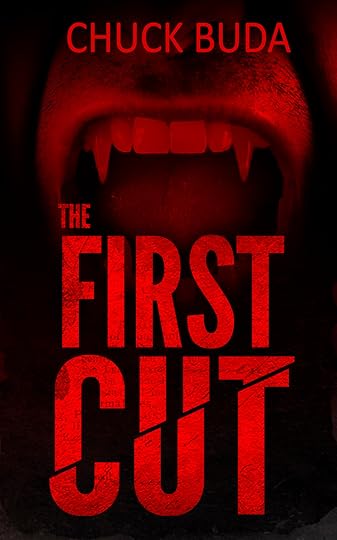
The First Cut: A Dark Psychological Thriller (Gushers Series Book 1)
By Chuck Buda
My rating: 4 of 5 stars
Do you like a little bit of horror in your pornography? Or maybe a lot of pornography in your horror? Because if so, hoo boy, Chuck Buda has got a doozy for you with the first in his aptly titled Gushers series, The First Cut.
What ever are a bunch of sex-starved high school seniors supposed to do as they bide their time for graduation and the start of college but form a secret society among themselves to get their rocks off? What seems like a good idea quickly escalates into something more as power-hungry Zoe leads them off into darker realms with some cult-like practices, with some support from her second-in-command Spencer, a young man with a strong interest in the Dark Arts, and a lot of hot tub orgies. A lot. Of hot tub. Orgies.
The First Cut comes with a reader advisory warning, and Buda ain't messing around there. This sucker is explicit in its erotic endeavors and nothing is left to the imagination as Zoe leads all the boys around by their nether regions, and even a pair of the kid's parents engage in some secret extramarital shenanigans. There's plenty of taboo titillation throughout, but since this is a horror book some scenes veer pretty far from the Penthouse Letters style as these characters' hook-ups go from amorous to aberrant. All kinds of bodily fluids gush and spill and mix together as the group seek new thrills and new highs.
Cutting through all the sex and violence is a surprisingly sweet center in Aiden and Leah, the quiet ones of the group who find their friendship deepening and blossoming into something more meaningful as their closest friends grow ever more hedonistic. Their relationship isn't without its fair share of complications, obviously - being in an insane sex cult presents its own fair share of hurdles - but Buda makes good use of their position in the story as the moral middle, their mostly-normal relationship providing a necessary and much-needed break from the more extreme craziness.
Narrating all this madness is Lillie Ways, who delivers an even-keel and professional reading. She differentiates character voices enough to make those conversations lacking dialogue tags easy to follow, and keeps the book's 54 short chapters moving along a nice pace for its six hour run-time. All in all, The First Cut provides a pleasing, at times surprising, aural experience.
Readers looking for some hot-and-heavy erotic horror in the split veined style of the Hot Blood anthologies should have a good time with The First Cut. These cherry-popping cultists will do you right...just before they do you very, very wrong.
View all my reviews
November 8, 2018
Review: Devouring Dark by Alan Baxter
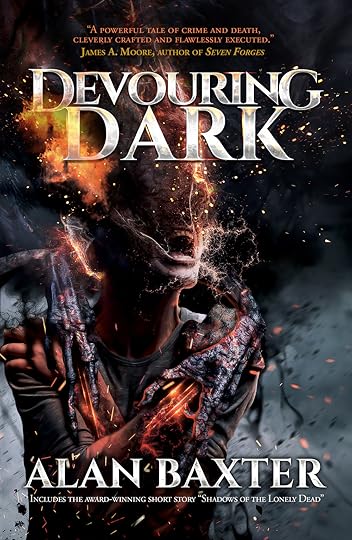
Devouring Dark
By Alan Baxter
My rating: 4 of 5 stars
Devouring Dark, the latest from Alan Baxter by way of Grey Matter Press, is a solid cross-genre affair, entertainingly blending supernatural horror and crime.
Matt McLeod has a darkness within him. Quite literally as it turns out, as he can summon this darkness and use it to kill those who have done wrong. In the book's opening chapter, we get a delicious taste of McLeod's peculiar brand of vigilante justice as he stalks and kills a pedophile in a London alley. In a stroke of coincidence that promises to not bode well for Matt, his exploits are caught on the cell phone camera of a hoodlum who works for local mobster Vince Stratton. Stratton thinks he can use Matt as an assassin, but Matt's none too keen on this idea. Add into the mix a nurse, Amy, who shares similar talents as Matt, and soon enough you're off to the races in a frenetic game of cat-and-mouse.
There's a lot of neat layers to Devouring Dark, and I had a lot of fun reading it, particularly as Matt works at digging his way out from under Stratton's thumb. Baxter builds an interesting web to connect his characters, although there's an awful lot here that hinges on coincidence. Thankfully, the story moves fast enough, the characters are involving enough, and the challenges befalling them are sufficiently difficult enough, that some of the overly lucky (or perhaps unlucky is more apt) strikes lining them all up just so aren't entirely noticeable or distracting on first pass.
Baxter has a great knack at using his character's voices to great effect, alternating chapters between their varied points of view, giving readers a nice array of perspective to view the story through. Although Matt is arguably the lead protagonist, it's Amy Cavendish who really shines and provides a few bright spots throughout the narrative. Amy's gift is similar to Matt's curse, but her role as a nurse, as well as her understanding of her power, allows her to use the darkness in a strikingly different way, but one that's true to her humanity.
Amy is also a conduit for Baxter, allowing him to speak up a bit on issues of palliative care and the ignominy of death. Baxter, Amy, and I find ourselves in full agreement on the issue of how we treat our sick and dying relatives from a medical perspective versus the ease with which we can end a pet's suffering. Despite our medical and scientific advancement, medically assisted suicide for human beings is still deeply taboo, but I'm more than sympathetic to the author's viewpoint, having had similar thoughts and discussions myself after losing loved ones to prolonged and painful illnesses.
Although it's a crime story first and foremost, Baxter does manage to fit in a vital message, one that I'd hope more people would give conscious thought and action toward, and I appreciate his willingness to broach it in both Devouring Dark and the bonus short story, "Shadows of the Lonely Dead," included at book's end. Mind you, Devouring Dark is hardly a treatise on the pros of assisted suicide, so if you're one of those who fret about politics in their fiction, worry not. Such moments are small in the sum of this book, but there are a few worthwhile, and dare I say vital, scenes that provide some necessary food for thought.
[Note: This review is based on an advance reading copy provided by the publisher.]
View all my reviews





